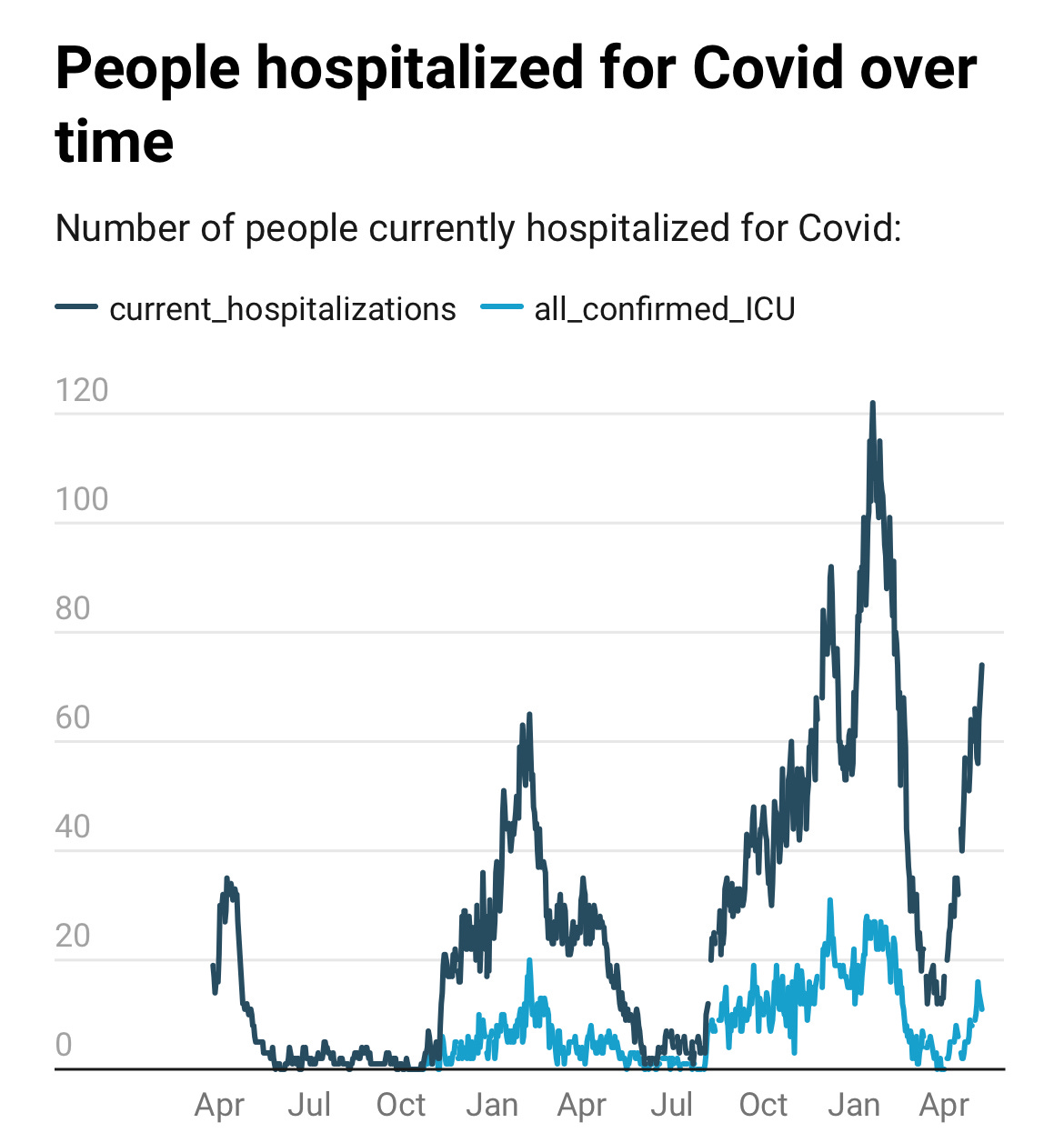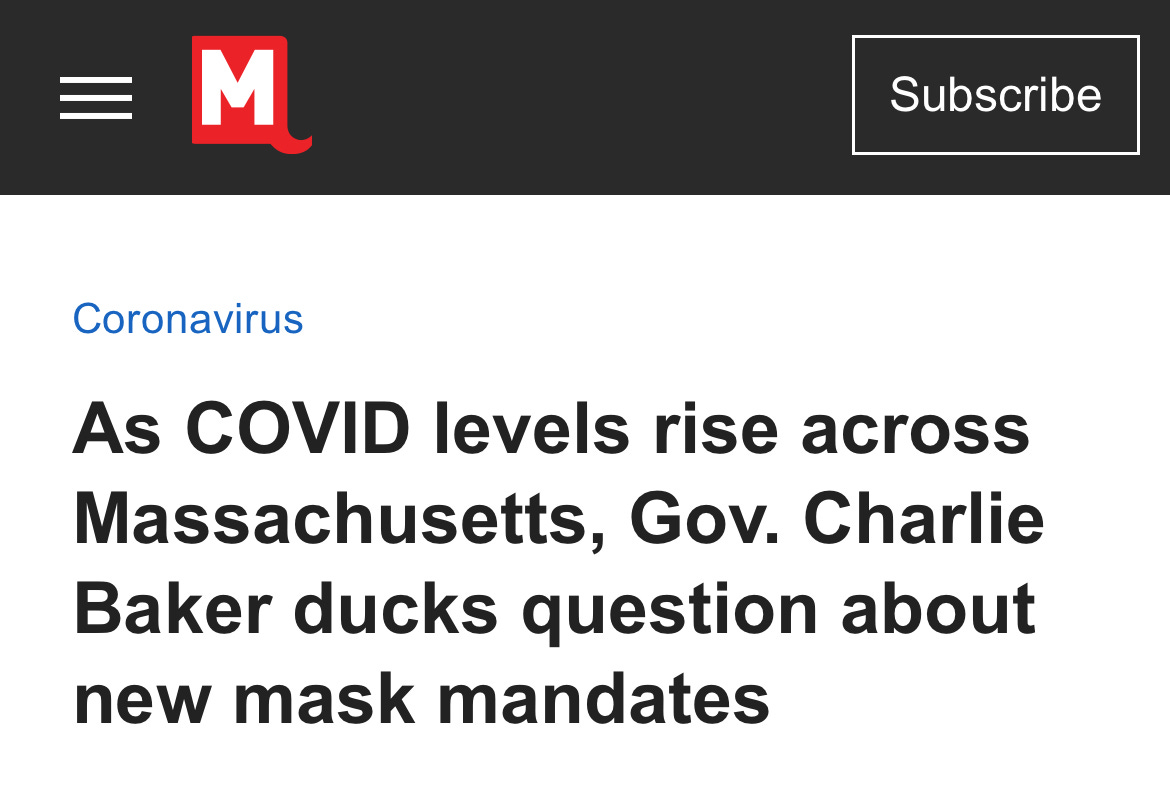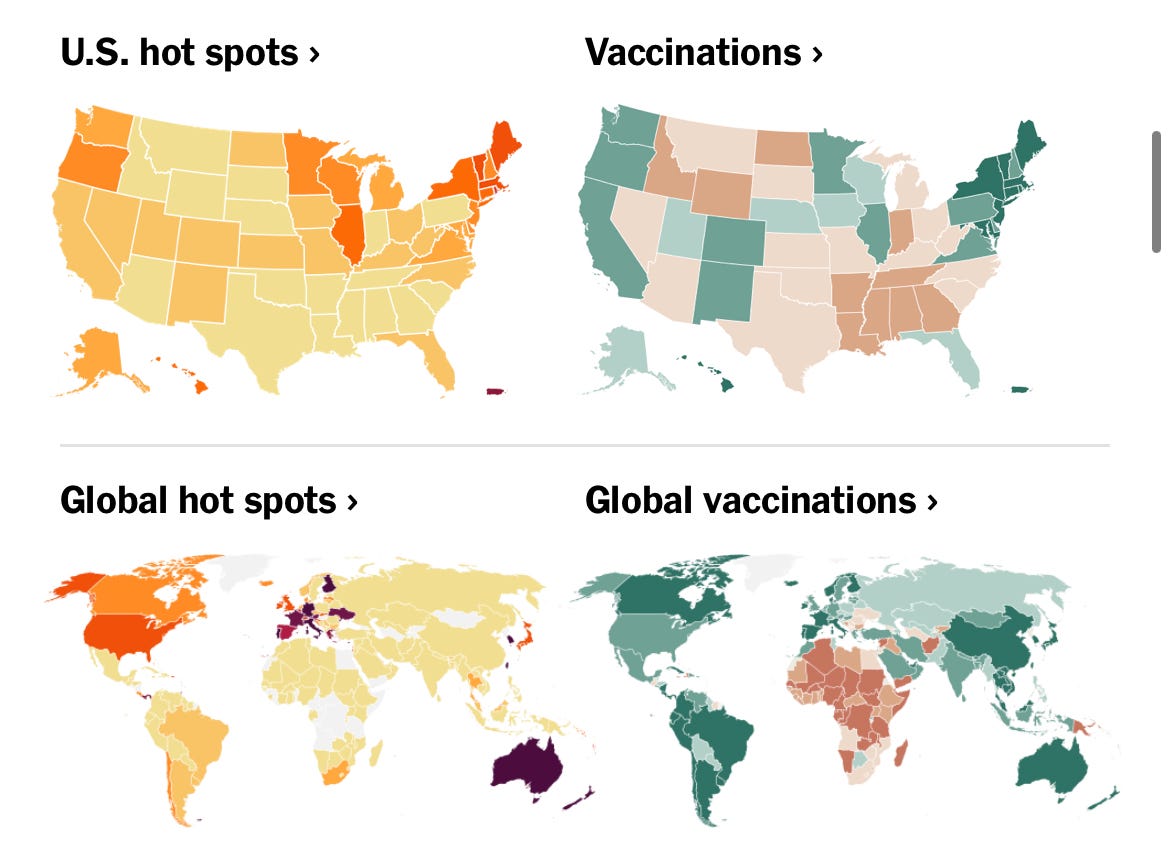Omicron is surging in highly vaccinated states; data from Vermont show the jabbed are now MORE likely to need hospitalization than the unvaccinated
Alex Berenson
May 10
Vermont is as European as American states get: mostly white, slow-growing, and left-leaning. It even has a socialist senator.
Vermont has European rates of Covid vaccination, too. About 90 percent of adults over 30 in Vermont are have been jabbed. Most of those are boosted - including about 85 percent of adults over 65.
Yet Vermont is now suffering its second major outbreak of Omicron in five months. Since late March, Covid hospitalizations have soared to the second-highest level ever in the state, trailing only the initial Omicron peak. The number of patients in intensive care is up even more.
Covid hospitalizations in Vermont (because Vermont is so small, 100 hospitalizations statewide translates into about 53,000 for the United States):

SOURCE
The surge is occurring almost exclusively in vaccinated people.
Each week, Vermont reports data on hospitalizations by vaccination status. They have shown a remarkable change in the last several weeks.
In the spring and summer of 2021, the happy vaccine valley, almost no vaccinated people were hospitalized statewide. Only a handful even contracted Covid.
During the Delta wave in the fall of 2021 and the first Omicron surge in December and January, hospitalizations jumped in both the unvaccinated and vaccinated and reached a roughly 50/50 split. But because so many more people were vaccinated, vaccinated people still had a much lower risk per-person.
Not anymore.
In March, as the first Omicron wave ended, hospitalizations in both unvaccinated and vaccinated people plunged. But since Omicron surged again in April, almost five times as many vaccinated people have been hospitalized.
Even accounting for the relative population sizes, vaccinated people were more likely to be hospitalized than the unvaccinated, state data show. (Those figures do not adjust either for age or the relative health status of the vaccinated.)
SOURCE
—
During the first two years of Covid, Vermont had relatively few deaths, possibly because it is so rural, like most other states low on the Covid death charts. Other Northeastern states, notably Massachusetts, on Vermont’s southern border, and New York, to the west, performed much worse.
But all those states have very high vaccination rates. And the differentials between them have nearly vanished. The new Omicron wave has hit them all hard.
Cases in Massachusetts are rising so quickly that the Team Apocalypse stalwarts in the media are all-but-begging for new mask mandates.

Death rates are rising too, although the spike in infections has occurred so quickly that they have not yet caught up. And as the winter surge demonstrated, Omicron is less dangerous than earlier variants to vaccinated and unvaccinated alike (a recent study that purported to show otherwise was hugely flawed because it failed to account properly for the shift to at-home Covid testing).
That said, Omicron still can do significant damage to the same groups that were vulnerable to earlier Covid variants - notably people over 75 and the morbidly obese. All-cause mortality spiked in December and January in both the United States and Europe, during the first Omicron wave.
—
But what is particularly troubling about the newest Omicron wave - not just in the United States but worldwide - is that it appears to hitting highly vaccinated states and countries much more heavily than less vaccinated areas.
In this chart from the New York Times, redder states and nations have higher infection rates; greener states and nations have higher vaccination rates. The correlation is so obvious that it is clearly visible at both the state and national level, no complex regression analysis needed.
Neither geography nor seasonality nor prior infection rates seem to matter - the post-vaccine epidemic is sweeping from Taiwan to Australia to Italy to Vermont. Meanwhile, in countries that did not use mRNA vaccines, Sars-Cov-2 has all-but-vanished - following the natural course of other respiratory epidemics, which rarely lasted more than one year or two at most.
So what comes next? It is nearly impossible to know, because the answer depends both on whether the mRNA shots retard the development of long-term post-infection immunity and how virulent the next variant might be.
At the moment citizens and politicians in the highly vaccinated countries have correctly decided they can live with this level of death and hospitalization from the coronavirus - not that anyone has a choice, since every control measure has now completely failed.
But the warning signs here are real, and global, no matter how much the media and public health establishment and politicians who cajoled or forced more than 1 billion people to get the mRNA vaccines want to ignore them.
At the moment citizens and politicians in the highly vaccinated countries have correctly decided they can live with this level of death and hospitalization from the coronavirus - not that anyone has a choice, since every control measure has now completely failed.
But the warning signs here are real, and global, no matter how much the media and public health establishment and politicians who cajoled or forced more than 1 billion people to get the mRNA vaccines want to ignore them.

No comments:
Post a Comment